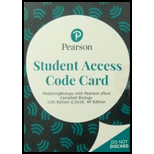
Concept explainers
SCIENTIFIC INQUIRY • INTERPRET THE DATA A Minnesota gardener notes that the plants immediately bordering a walkway are stunted compared with those farther away. Suspecting that the soil near the walkway may be contaminated from salt added to the walkway in winter, the gardener tests the soil. The composition of the soil near the walkway is identical to that farther away except that it contains an additional 50 mM NaCl. Assuming that the NaCl is completely ionized, calculate how much it will lower the solute potential of the soil at 20°C using the solute potential equation:
Ψs= -iCRT
where i is the ionization constant (2 for NaCl), C is the molar concentration (in mol/L), R is the pressure constant [R = 0.00831 (L • MPa)/(mol • K)],and T is the temperature in Kelvin (273 + °C).
How would this change in the solute potential of the soil affect the water potential of the soil? In what way would the change in the water potential of the soil affect the movement of water in or out of the roots?
Trending nowThis is a popular solution!

Chapter 36 Solutions
CAMPBELL BIOLOGY-MASTERINGBIOLOGY ACC.
- Direction: Explain the following in paragraph form consists of at least five sentences Stomates must be open for evaporation to occur. Going back to the last lesson, how plant transport and gas exchange happens?arrow_forwardImagine yourself as a water molecule in the soil solution of aforest. In a short essay (100–150 words), explain what pathwaysand what forces would be necessary to carry you to the leaves ofthese trees.arrow_forward"Plants, just like any organism, have evolved structures to solve the challenges of life. Plants need to transport water from the ground to the leaves for _________"I feel like that's a vague question and I don't understand it!arrow_forward
- Observation: I want to know what effect salt has on the growth of grass. So I measure out 3 equal-sized squares of grass out the back of the Green Building. The first square of lawn I water with 5 liters of pure water from a watering can every day. The second square of lawn I water with 5 liters of pure water with 2 grams of salt mixed in, every day. The third square of lawn I water with 5 liters of pure water with 4 grams of salt mixed in, every day. I measure the height of the grass after 14 days and note the following observations. The first square is green and 15 cm high. The second square is greeny-yellow and 6 cm high. The third square is yellowy-brown and looks dead and is only 2cm high. What could we infer about the effect salt has on the growth of grass?arrow_forwardWhich statement(s) is/are false? * A. A water potential lower than that of the soil draws water into the roots and a water potential lower than that of the stem draws water into the leaf. B. A water potential lower than that of the soil draws water into the roots and a water potential higher than that of the stem draws water into the leaf. C. Water potential and solute concentration increases from the roots to the top of the plant. D. Water enters the plant through the root hairs and exits through the lenticels and stomates. E. A and D F. B and Carrow_forwardPlants can transport water from their roots to their canopy regardless of their height. What properties of water make this long distance transport possible? Plants can transport water from their roots to their canopy regardless of their height. What properties of water make this long distance transport possible? Water can dissolve many substances Water has a high specific heat Cohesiveness of water Adhesiveness of water Choices A and B Choices A and Carrow_forward
- A farmer has noticed that his soybean plants produce more beans in some years than others. He claims to always apply the same amount of fertilizer to the plants but he suspects the difference in crop yield may have something to do with the amount of water the crops receive. The farmer has observed that the soybeans on his farm usually receive between 0 to 0.5 inches of water per day, but he is unsure of the optimal amount of water with which to irrigate. Question: state a research question that will directly address the farmer’s problem.arrow_forwardThrough what structure(s) do plants obtain most of their water? roots stomata interior cells leavesarrow_forwardWater potential is a driving force in plants’ ability to transport water. Explain what water potential is, and describe a specific example of its role in water movement throughout a plant.arrow_forward
- SCIENTIFIC INQUIRY Acid precipitation has an abnormallyhigh concentration of hydrogen ions (H+). One effect ofacid precipitation is to deplete the soil of nutrients suchas calcium (Ca2+), potassium (K+), and magnesium (Mg2+).Suggest a hypothesis to explain how acid precipitationwashes these nutrients from the soil. How might you testyour hypothesis?arrow_forwardDescribe the cohesion-tension theory as an explanation for longdistance water movement in plants.arrow_forwardEXPERIMENT : GRAVIMETRIC ANALYSIS OF PHOSPHORUS IN PLANT FOOD Aim: To determine the amount of phosphorus in a commercial plant food Objectives:.......... I want Objectives for this experimentarrow_forward
 Biology (MindTap Course List)BiologyISBN:9781337392938Author:Eldra Solomon, Charles Martin, Diana W. Martin, Linda R. BergPublisher:Cengage Learning
Biology (MindTap Course List)BiologyISBN:9781337392938Author:Eldra Solomon, Charles Martin, Diana W. Martin, Linda R. BergPublisher:Cengage Learning Biology: The Dynamic Science (MindTap Course List)BiologyISBN:9781305389892Author:Peter J. Russell, Paul E. Hertz, Beverly McMillanPublisher:Cengage Learning
Biology: The Dynamic Science (MindTap Course List)BiologyISBN:9781305389892Author:Peter J. Russell, Paul E. Hertz, Beverly McMillanPublisher:Cengage Learning

